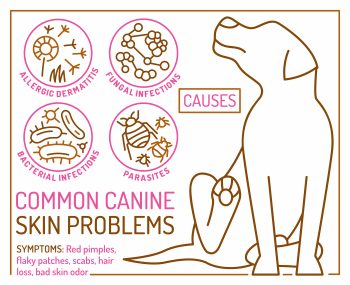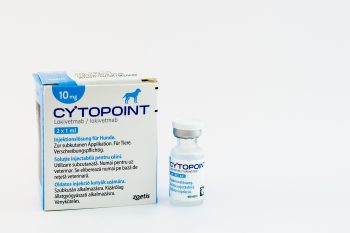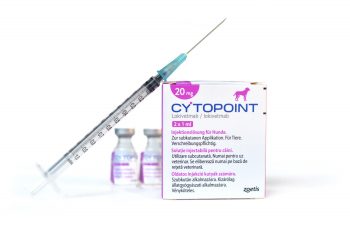Cytopoint is an innovative, breakthrough treatment for atopic dermatitis (also known as eczema) in dogs. This medication has transformed the way veterinarians manage this chronic, itching skin condition. In this article, we will discuss what Cytopoint is, what it’s used for, its effectiveness, and safety profile.
What is Cytopoint?
Cytopoint is a monoclonal antibody that targets and neutralizes interleukin-31 (IL-31), a cytokine that plays a crucial role in the itch signal pathway. Itchiness is a predominant and distressing symptom of atopic dermatitis, which makes it an essential target for treatment.
Unlike traditional medications like corticosteroids and antihistamines, Cytopoint does not suppress the immune system or cause sedation. Instead, it works by specifically targeting IL-31 and blocking its actions. By doing so, it provides relief from the intense itching associated with atopic dermatitis.
What is it Used For?
Cytopoint is primarily used for treating atopic dermatitis in dogs, a chronic skin condition that causes inflammation and itching. Atopic dermatitis is an allergic reaction to environmental allergens like pollen, mold spores, and dust mites. It’s a common condition in dogs, affecting up to 10% of the canine population.
What is Atopic Dermatitis?
Atopic dermatitis (AD), also known as atopic eczema, is a chronic skin condition that causes inflammation and itching. It is commonly associated with allergies and is characterized by red, itchy, and inflamed skin. Atopic dermatitis can affect both humans and animals, including dogs.
In dogs, atopic dermatitis is often triggered by environmental allergens, such as pollen, mold spores, dust mites, or animal dander. When a dog with a genetic predisposition to atopic dermatitis comes into contact with these allergens, their immune system may overreact, leading to skin inflammation and itching.
The main symptoms of atopic dermatitis in dogs include:
- Intense itching: Affected dogs may scratch, lick, or chew their skin excessively.
- Redness and inflammation: The skin may become red, swollen, and warm to the touch.
- Skin lesions: Repeated scratching and licking can lead to skin sores, scabs, or crusts.
- Hair loss: Excessive scratching and licking can cause hair loss, particularly in the affected areas.
- Secondary infections: The damaged skin barrier and constant scratching can make it easier for bacteria or yeast to cause skin infections.
Atopic dermatitis is a chronic condition, and it may require long-term management to reduce symptoms and improve the affected dog’s quality of life. Treatment options may include allergen avoidance, topical treatments (creams or shampoos), oral medications (antihistamines, corticosteroids, or immunosuppressants), and injectable treatments like Cytopoint.
How Effective is Cytopoint?
Cytopoint has been proven effective in multiple clinical trials and real-world studies. In one study, more than 80% of dogs treated with Cytopoint showed a significant reduction in itchiness within a week of treatment. Additionally, Cytopoint has been shown to improve the quality of life for both dogs and their owners.
One of the main advantages of Cytopoint is its long-lasting effect. A single injection can provide relief for four to eight weeks, depending on the dog’s individual response to the treatment. This extended duration of action makes it a convenient option for managing atopic dermatitis in dogs.
Is Cytopoint Safe for Dogs?
Cytopoint has a favorable safety profile and is generally well-tolerated in dogs. In clinical trials, the most common side effects were mild and included vomiting, diarrhea, and lethargy. These side effects were usually transient and did not require any additional treatment.
Cytopoint is considered safe for long-term use and can be used in conjunction with other treatments for atopic dermatitis, such as corticosteroids or antihistamines. However, it is essential to consult with your veterinarian before starting any new treatment for your pet. Your veterinarian can assess your dog’s individual needs and help you determine the most suitable treatment plan.
Frequently Asked Questions
What is Cytopoint?
Cytopoint is a prescription medication for dogs suffering from atopic dermatitis. It is an injectable monoclonal antibody that targets and neutralizes interleukin-31 (IL-31), a protein associated with itching.
How does Cytopoint work?
Cytopoint works by specifically targeting IL-31, a cytokine involved in the itch signal pathway. By blocking IL-31, Cytopoint effectively reduces the itchiness associated with atopic dermatitis.
How is Cytopoint administered?
Cytopoint is administered by a veterinarian through a subcutaneous injection. The frequency of the injections will be determined by the vet based on the dog’s individual needs.
How long does Cytopoint last?
Cytopoint’s effects can last between four and eight weeks, depending on the severity of the condition and the dog’s individual response to the treatment.
What are the side effects of Cytopoint?
The most common side effects reported in clinical trials were mild and included vomiting, diarrhea, and lethargy. However, most dogs tolerate the treatment well.
Is Cytopoint safe for long-term use?
Cytopoint has been shown to be safe for long-term use in clinical trials. However, individual responses may vary, and it’s essential to consult with your veterinarian for a proper treatment plan.
Can Cytopoint be used with other medications?
Yes, Cytopoint can be used in conjunction with other treatments for atopic dermatitis, such as corticosteroids or antihistamines. It’s essential to discuss the complete treatment plan with your veterinarian.
How quickly does Cytopoint start working?
Cytopoint starts reducing itchiness within 24 hours of administration. Most dogs experience significant relief within one week of treatment.
How often does my dog need a Cytopoint injection?
The effects of a Cytopoint injection typically last for 4 to 8 weeks. However, the frequency of injections will be determined by your veterinarian based on the severity of your dog’s condition and their individual response to the treatment.
Can I give my dog other medications while they are receiving Cytopoint?
Yes, Cytopoint can be used in conjunction with other treatments for atopic dermatitis, such as corticosteroids, antihistamines, or antibiotics for secondary skin infections. However, always consult with your veterinarian before starting any new medications.
Are there any dogs that should not receive Cytopoint?
Cytopoint is generally safe for most dogs. However, it may not be recommended for dogs with certain health conditions, pregnant or nursing dogs, or dogs with a history of hypersensitivity to the drug. Your veterinarian will evaluate your dog’s overall health and medical history before recommending Cytopoint as a treatment option.
Will Cytopoint cure my dog’s atopic dermatitis?
Cytopoint does not cure atopic dermatitis, but it provides effective relief from the itching associated with the condition. Atopic dermatitis is a chronic condition that may require long-term management. Cytopoint can be part of an ongoing treatment plan to manage your dog’s symptoms and improve their quality of life.
Can I bathe my dog after a Cytopoint injection?
Yes, you can bathe your dog after a Cytopoint injection. Regular bathing with a mild, hypoallergenic shampoo can help remove allergens from your dog’s skin and reduce itching.
What is the proper dose of Cytopoint?
The appropriate dosage of Cytopoint for your dog depends on their weight. Cytopoint is administered as an injection by a veterinarian, and the dosage is calculated based on your dog’s body weight.
The recommended dose of Cytopoint is 2 milligrams per kilogram of body weight. However, it’s important to note that the dosage may vary depending on your dog’s specific needs and the veterinarian’s assessment.
Please consult your veterinarian to determine the appropriate dosage for your dog. They will assess your dog’s overall health, weight, and severity of atopic dermatitis to decide on the most suitable dosage and treatment plan. It’s crucial not to self-administer or alter the dosage without consulting your veterinarian, as this could lead to adverse effects or suboptimal treatment results.
Is Cytopoint a steroid?
No, Cytopoint is not a steroid. It is a monoclonal antibody that targets and neutralizes interleukin-31 (IL-31), a protein involved in the itch signal pathway. Unlike steroids, Cytopoint does not suppress the immune system or cause side effects like increased thirst, urination, or appetite.
How much does Cytopoint treatment cost?
The cost of Cytopoint treatment varies depending on factors such as your location, the size of your dog, and the frequency of injections. Your veterinarian will be able to provide you with an accurate estimate based on your dog’s specific needs.
Conclusion
Cytopoint is a revolutionary treatment for atopic dermatitis in dogs, providing long-lasting relief from the intense itching associated with this condition. It is effective, safe, and well-tolerated, making it an excellent option for managing atopic dermatitis in dogs. If your dog suffers from this chronic skin condition, talk to your veterinarian about Cytopoint as a potential treatment option.
Please note that the information provided in this article is intended for informational purposes only and should not be considered a substitute for professional veterinary advice. Always consult with your veterinarian before making any decisions regarding your pet’s health.





 Toledo, United States.
Toledo, United States.